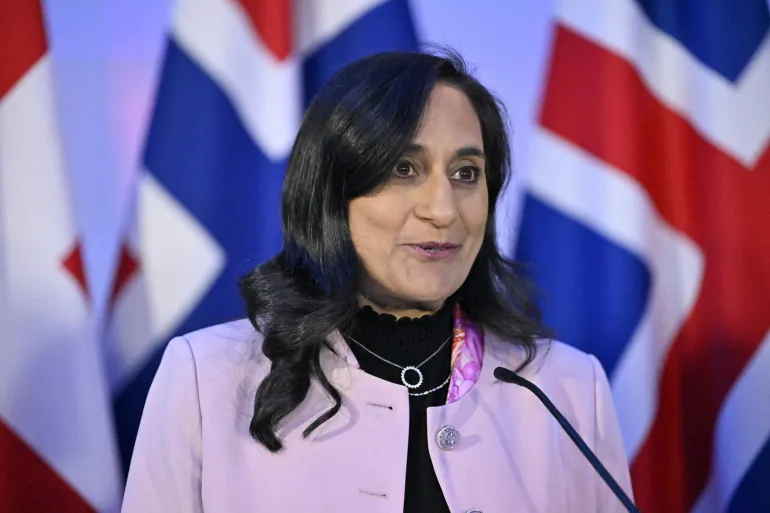Canada-Israel relations face new strain after Ottawa condemned Israel’s strike on Hamas leaders in Qatar. Foreign Minister Anita Anand said the attack was unacceptable, especially since Qatar has played a central role in mediating peace efforts in the Middle East. Her remarks mark another sign of Canada’s shifting stance toward Israel under Prime Minister Mark Carney.
Ottawa’s Strong Reaction
Speaking to reporters in Edmonton, Anand confirmed that Canada is reassessing its position toward Israel. “We are evaluating our relationship with Israel,” she said, stressing that Canada viewed the Doha strike as a serious violation.
Anand added that the government is reviewing possible responses but stopped short of announcing concrete measures. When asked about sanctions, she said only, “We will continue to evaluate our next steps.”
Her comments followed a major statement earlier in the day by European Commission President Ursula von der Leyen, who announced plans to cut support for Israel and introduce sanctions. Canada now appears to be weighing whether to follow Europe’s lead.
A Shift Under Carney
Canada’s foreign policy toward Israel has hardened significantly since Mark Carney took office in January. Unlike his predecessor, Justin Trudeau, who largely backed Israel’s campaign against Hamas, Carney has taken a more critical tone.
In July, Carney announced that Canada would recognize Palestinian statehood, a move that angered Israel and signaled a turning point in Ottawa’s Middle East approach. He argued that recognition was necessary for a lasting two-state solution.
Carney has also criticized Israeli plans for Gaza. Just last month, he called Israel’s proposal to seize control of Gaza City “wrong.” On Tuesday, he denounced the Qatar strike as “an intolerable expansion of violence” that risked spreading conflict across the region.
The Doha Attack
Israel’s strike in Doha targeted senior Hamas leaders who had taken refuge in Qatar. The attack drew swift condemnation, not only because it escalated hostilities but also because it undermined Qatar’s efforts to mediate between Israel and Hamas.
Qatar has hosted several negotiation rounds aimed at reducing violence in Gaza and advancing talks on prisoner exchanges. By striking in Doha, Israel not only risked diplomatic fallout but also disrupted ongoing mediation.
Ottawa’s rebuke underscored the seriousness of the incident. For Canada, the attack represented not just a violation of Qatari sovereignty but also a setback for international peace efforts.
Read: Oil Prices Edge Higher After Israeli Strikes
Canada’s Options
Canada now faces a critical decision on how to respond. Sanctions are one option, though Ottawa has historically been cautious about such measures against Israel. Diplomatic downgrades or limits on cooperation could also be considered.
Anand’s comments suggest that nothing is off the table. However, she emphasized that any decision will align with Canada’s broader foreign policy principles, particularly its support for peace negotiations and human rights.
Contrast With Past Policy
Under Justin Trudeau, Canada maintained close ties with Israel, often defending its right to self-defense against Hamas. While Trudeau occasionally criticized excessive force, his government resisted calls to recognize Palestinian statehood or impose penalties on Israel.
Carney’s government represents a clear break. By committing to recognition of Palestine and publicly challenging Israeli policies, Ottawa is charting a new course. The evaluation of ties after the Qatar strike only deepens this shift.
Regional and Global Context
The timing of Canada’s reevaluation is significant. The Middle East remains volatile, with violence in Gaza continuing and diplomatic initiatives struggling to gain traction.
European leaders have begun to take stronger measures against Israel, reflecting growing frustration with its military strategy and settlement policies. Canada’s alignment with Europe would add weight to international pressure on Israel.
At the same time, the United States, Israel’s closest ally, has maintained its traditional backing, creating a divide between Washington and other Western capitals. Canada’s next steps will signal where it stands in this evolving landscape.
Domestic Political Implications
Carney’s tougher stance on Israel could have domestic political consequences. Canada’s foreign policy on the Middle East has long divided public opinion. Support for Palestinian rights has grown among younger Canadians and civil society groups, while pro-Israel voices remain strong in other sectors.
By taking a harder line, Carney may strengthen his image as a leader willing to stand up for human rights. But he also risks criticism from those who see Israel as a key democratic ally in the region.
The Road Ahead
For now, Canada has left its options open. The government’s decision will depend on how Israel responds to international criticism and whether further escalation occurs. If Ottawa moves closer to Europe by cutting support or imposing sanctions, it would mark one of the most significant shifts in Canada-Israel relations in decades.
What is clear is that Canada is no longer taking a neutral or supportive stance toward Israel’s actions. The Qatar strike has become a turning point, forcing Ottawa to weigh its principles against longstanding diplomatic ties.
Follow us on Instagram, YouTube, Facebook,, X and TikTok for latest updates
